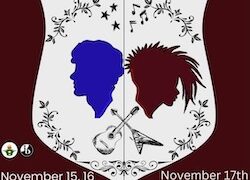Written by
Michal Liberman
YPSILANTI – An Eastern Michigan University Master of Fine Arts alumna (class of ’18) is now the founder of a nonprofit called the Art Kettle, an organization that nurtures creativity and promotes diversity by engaging communities in cultural events, including art shows, performances and live music.
Laura Earle, who graduated from EMU last spring, partnered with EMU graduate students in Arts Administration and with Riverfolk Music and Arts Organization to build the infrastructure to provide distinct arts and music exhibits to the southeast Michigan area.
“The Art Kettle actually began as an art history discussion question,” Earle said. “And it morphed into a fully functioning nonprofit arts venue six months later.”
It all started in March 2018, when Earle took the Feminist Art History Seminar at EMU led by Ellen C. Schwartz, a professor of art history at Eastern. In the classroom they discussed Womanhouse, the landmark 1972 whole-house art installation by a group of women artists led by feminist movement icons Judy Chicago and Miriam Schapiro.
That group turned a dilapidated Los Angeles mansion into an expansive artwork expressing the female experience in America during a time when the professional art world was even less accessible to women artists than it is today.
The EMU seminar spent weeks discussing Womanhouse, and many questions were raised, such as, “If Womanhouse happened today, what kind of work would artists make?”
The class wondered: Were there any issues solved? How would motherhood and sexual freedom be portrayed in art today? How would artwork address gender construction? What contemporary issues for women are on artists’ minds today? Gun violence? Racism?
“After several weeks of these question resurfacing, my curiosity peaked,” Earle recalls. “One evening I blurted out – I have a house we could use – want to find out?” And so the Art Kettle began.
“The deal Laura offered was to help clean up the house, and transform it into an art installation in the manner of the original Womanhouse in the 70s.” Schwartz said. “This was a beautiful 3,400 square foot house in Manchester, built in the 1830s, but it was in terrible shape.”
Dozens of dedicated artists, including eleven from EMU, cleaned the house for months. They came every weekend as a group or individually during the weekdays. “I had never seen anything like this,” Schwartz said.

The next step was for the artists to decide how they wanted the house to look as they installed their individual art pieces for the “Dear Womanhouse” show. Concurrently, Earle sought fiscal sponsorship from Riverfolk Music and Arts to form the Art Kettle, expanding visual arts programming in an underserved community. Partnering with Manchester Village leaders, Earle planned future exhibits for the Art Kettle. There was strong support from village residents who wanted to be involved in the arts, and many were excited about the opening of an art center in the small village of Manchester.
“The opening pop-up show in September of 2018 was a great success and featured local artists with ties to Manchester,” said Schwartz. “Then, in October we brought challenge with controversy and diversity through art in a very neat experience called “Dear Womanhouse, What Now?”
The Dear Womanhouse exhibit filled two floors with more than 60 artworks, the more controversial topics were upstairs, to keep it away from children. Staff sent a clear caveat to the Art Kettle visitors – this is not for everyone. One exhibit was called “The Unspeakable Room,” about child sexual abuse, abduction and violence against women. Other spaces addressed abortion, gun violence, and body image struggles. Visiting musicians, poets and artists gave public presentations, drawing visitors from all over the region.
“It was so important to hear as many artistic voices as possible,” Earle explained. To include the next generation of artists, EMU professor Cam McComb wrote a secondary school curriculum that brought the Womanhouse experience into classrooms in Ann Arbor, Ypsilanti and Warren.
The curriculum featured a scale model of the Art Kettle house for students to transform into their own miniature exhibit about their views of the female experience in America today. These were displayed as part of the Dear Womanhouse exhibit.
Today, the Art Kettle is a year-round art center with changing exhibits and a planned residency program as it seeks to partner with multiple arts organizations in southeast Michigan and beyond. The center continues to engage EMU art students, community members and regional secondary school students to nurture creativity and promote diversity.
For more information about the Art Kettle visit the art center’s website.
About Eastern Michigan University
Founded in 1849, Eastern is the second oldest public university in Michigan. It currently serves more than 18,000 students pursuing undergraduate, graduate, specialist, doctoral and certificate degrees in the arts, sciences and professions. In all, more than 300 majors, minors and concentrations are delivered through the University’s Colleges of Arts and Sciences; Business; Education; Health and Human Services; Technology, and its graduate school. EMU is regularly recognized by national publications for its excellence, diversity, and commitment to applied education. For more information about Eastern Michigan University, visit the University’s website.








